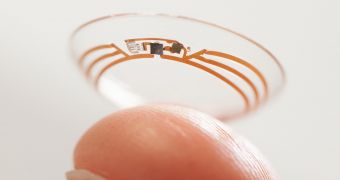Last week it was reported that the Google X team was meeting with the Food and Drug Administration (FDA), which left everyone wondering what could possibly be going on. Well, wonder no more, as the company has unveiled smart contact lenses that will serve people with diabetes.
You certainly read that right. The company has shown concern over the years for health-related issues, going as far as launching Calico, a new company that wants to help everyone live much longer lives.
“Although some people wear glucose monitors with a glucose sensor embedded under their skin, all people with diabetes must still prick their finger and test drops of blood throughout the day. It’s disruptive, and it’s painful. And, as a result, many people with diabetes check their blood glucose less often than they should,” Google’s Brian Otis and Babak Parviz explain about what pushed them to their latest project.
They also mention that over the years, scientists have discovered that tears can provide a lot of data about a diabetic’s state of health, particularly their glucose levels.
Well, Google X thought that perhaps creating miniaturized electronics would be able to “crack the mystery of tear glucose and measure it with greater accuracy.”
The way they figured to do this is by creating smart contact lenses that measure glucose levels in tears by using a tiny wireless chip and a glucose sensor. They’re both embedded between two layers of soft contact lens material.
The small devices are currently being tested out and they can generate a reading once per second, which seems to be more than enough to tell a person’s health.
“We’re also investigating the potential for this to serve as an early warning for the wearer, so we’re exploring integrating tiny LED lights that could light up to indicate that glucose levels have crossed above or below certain thresholds,” the announcement reads.
The technology is still in the first stages, but the company has already completed multiple clinical research studies, which should help refine the prototype.
“We hope this could someday lead to a new way for people with diabetes to manage their disease,” the two project co-founders write.
They also admit that they’re currently in discussions with the FDA, as previously reported, but they’re still some ways away from turning this technology into a system people can use. Google is looking for partners to help bring the product to the market.

 14 DAY TRIAL //
14 DAY TRIAL //